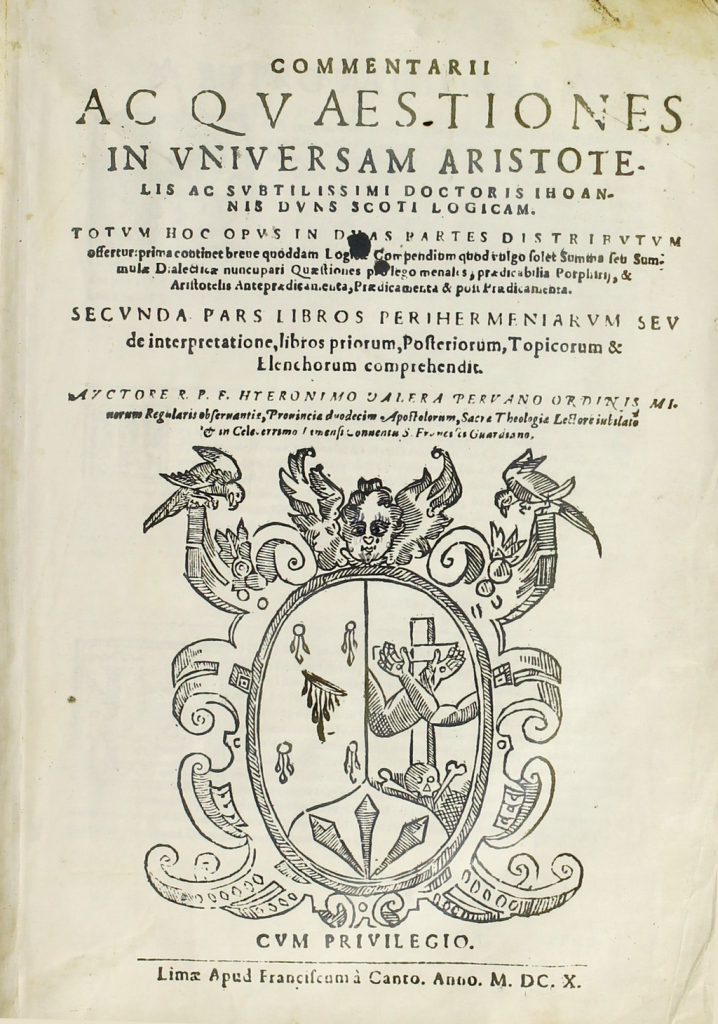
Libraries
Libraries
Comentarii ac quaestiones in vniuersam Aristotelis ac subtilissimi doctoris Ihoannis Duns Scoti logicam
In 1610 the first philosophical work written in American lands was published in Lima, the Commentarii ac quaestiones in universam Aristotelis ac subtilissimi Doctoris Iohannis Duns Scoti logicam or known mainly as the Logica via Scoti. The author of said writing was the Franciscan Chachapoyano Jerónimo de Valera (1568-1625), “hijo de los nobles conquistadores”, according to the illustrious chronicler, also Franciscan, Diego de Córdova y Salinas. In 1589 he professed his first religious vows in the Franciscan Province of the Twelve Apostles of the Seraphic Order of Friars Minor. He was guardian of the Convent of San Francisco de Lima and, later, Provincial. In parallel to his pastoral and ecclesiastical work, he developed his academic work as an excellent orator and a man of vast classical culture with deep philosophical and theological knowledge.
Fray Jerónimo knew with clarity and rigor the philosophical and theological doctrine of Juan Duns Escoto (1266-1308), the Subtle Doctor. In this way, he continued with the work of Juan del Campo, fifth provincial of the Province of the Twelve Apostles, who introduced to Peru the Scotist thought that played a very important role in the intellectual and spiritual consciousness of the West at the end of Scholasticism and beginnings. of Modernity, just at the moment when the meeting of the European world and the American world occurs. The philosophers and theologians of the Spanish Golden Age, especially those of the School of Salamanca, knew the Scotist doctrine very well; Thus they applied it to their writings and teachings by means of three important theses: freedom as an antecedent and unrestricted faculty of law, the voluntarist perspective of the law and the individual and perfect nature of all men and, transferring it to the very capital of the viceroyalty of Peru, as a doctrine to be studied and applied.
Soon, Scotism along with Thomism and nominalism played a crucial role in the intense intellectual life of the Peruvian viceroyalty. Although there is no doubt about the date of publication, it is good to take into account what Professor Santiago Céspedes Agüero maintains: “the handwritten work ready for printing was by the end of 1607, it received approvals between March 13 and March 26 April 1608 and was printed in 1609. Later it was corrected. This is known by «fe de erratas». From this it follows that it would only have been published the following year, in 1610”. However, this work is crucial for two very important reasons.
In the first place, it is the first philosophical work published in the entire American world. Second, the content of this text re-elaborates the logic as a whole in such a way that the textual plot develops a philosophy of language and is inserted in the viceregal debate with Juan Espinoza Medrano, el Lunarejo, and Ildefonso de Peñafiel and in the American debate with the Mexican Antonio Rubio.
The novelty of these authors is in the fact that they had the ability to rework concepts from the American reality for universal thought as a truly original contribution that, happily in our days, is beginning to be valued and known. And I am convinced that an interdisciplinary approach between philosophy, history, literature, theology, poetry, the arts and other humanistic areas will be much more fruitful than Jerónimo’s work, which has not yet been fully translated, but which in its neat viceregal Latin treasures the richness of our cultural heritage.
Jean Christian Egoavil
Proyecto Estudios Indianos
Digital Resources
About Valera and his work
Victor Céspedes Agüero: “Jerónimo de Valera, padre del criollismo”
Ma. Luisa Rivara de Tuesta: “La influencia de los clásicos en la filosofía colonial peruana. Fray Jerónimo de Valera”
Varia
Walter Redmond: “La Lógica en los siglos XVI y XVII”

